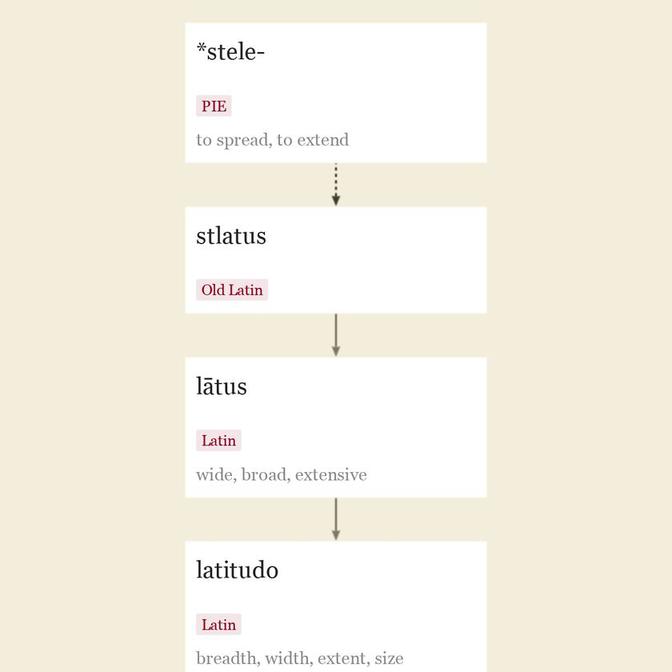longitude (n.)
14世纪晚期,“长度; 高度”,还有“天空穹顶或地球表面的东西距离的天文或地理经度”,源自拉丁语 longitudo “长度,长时间”,来自 longus “长”(参见 long(形容词))。关于地理意义的解释,请参见 latitude。
longitude 的相关词汇

14世纪晚期,“宽度”,来自古法语 latitude(13世纪)和直接源自拉丁语 latitudo “宽度,宽度,范围,大小”,来自 lātus(形容词)“宽,广,广泛”的古拉丁语 stlatus,源自 PIE *stleto-,是 *stele- “扩散,扩展”的后缀形式(源头还包括古教会斯拉夫语 steljo “展开”,亚美尼亚语 lain “宽”)。
地理和天文学意义也来自14世纪晚期,字面意思是已知世界地图的“宽度”。比喻意义上的“允许的变化程度,偏离标准的范围”早在15世纪就出现了。相关词汇: Latitudinal “与地理纬度有关的”(1777); latitudinous “解释宽泛的”(1829,美国英语)。
The ancients supposed the torrid and the frigid zones to be uninhabitable and even impenetrable by man, but while the earth, as known to them, was bounded westwardly by the Atlantic Ocean, it extended indefinitely towards the east. The dimensions of the habitable world then (and ancient geography embraced only the home of man ....,) were much greater, measured from west to east, than from south to north. Accordingly, early geographers called the greater dimension, or the east and west line, the length, longitudo, of the earth, the shorter dimension, or the north and south line, they denominated its breadth, latitudo. These Latin terms are retained in the modern geography of most European nations, but with a modified meaning. [George P. Marsh, "Lectures on the English Language," 1882]
古人认为热带和寒带是不适宜居住的,甚至是人类无法穿越的,但当他们所知道的地球向西被大西洋所限制时,它向东无限延伸。因此,早期地理学家称更大的尺寸或东西线为地球的 length,长度,较短的尺寸或南北线则称为 breadth,宽度。这些拉丁术语在大多数欧洲国家的现代地理学中仍然保留,但含义有所改变。[乔治·P·马什,“英语语言讲座”,1882年]
古英语 lang "具有很大的线性范围,从一端延伸到另一端; 高的; 持久的",源自原始日耳曼语 *langa-(也源自古弗里斯兰语和古撒克逊语 lang,古高地德语和德语 lang,古诺尔斯语 langr,中古荷兰语 lanc,荷兰语 lang,哥特语 laggs "长")。
这些日耳曼语可能源自 PIE *dlonghos-(也源自拉丁语 longus "长,延伸; 更远的; 长时间的; 远离的,遥远的",古波斯语 darga-,波斯语 dirang,梵语 dirghah "长"),源自 *del- (1) "长"的词根(也源自希腊语 dolikhos "长", endelekhes "永久的")。因此,拉丁语 longus(源自 prolong, elongate, longitude 等)可能与日耳曼语有亲缘关系,但不是其源头。这个词说明了古英语在 -n- 之前短"a"变成短"o"的倾向(也保留在 bond/band 和西米德兰方言 lond 中,源自 land 和 hond,源自 hand)。
在古英语中,还指时间上的"持续很久",带有"严肃"的意味。旧时的"高的"意义现在似乎只在方言中存在或已过时。For long "在很长时间内"可追溯到公元1300年。成为 long on 某物,意思是"拥有很多",始于1900年,美国俚语。long vowel(约1000年)最初是指延长的时间。数学上的 long division 始于1808年。体育上的 long ball 始于1744年,最初用于板球。作为一项体育赛事的 Long jump 可追溯到1864年。long face,指表达悲伤或庄重时向下拉的脸部表情,始于1786年。Long in the tooth(1841年指人)源自马匹牙龈后退显示年龄(但直到1870年才有此意义)。Long knives,指白人定居者给予的名称(最初在弗吉尼亚/肯塔基),始于1774年,可能是对他们的剑的参考。Long time no see,据说模仿美洲印第安人的语言,首次记录于1919年,即中式英语。
14世纪晚期,源自中世纪拉丁语 longitudinalis,源自拉丁语 longitudo(参见 longitude)。